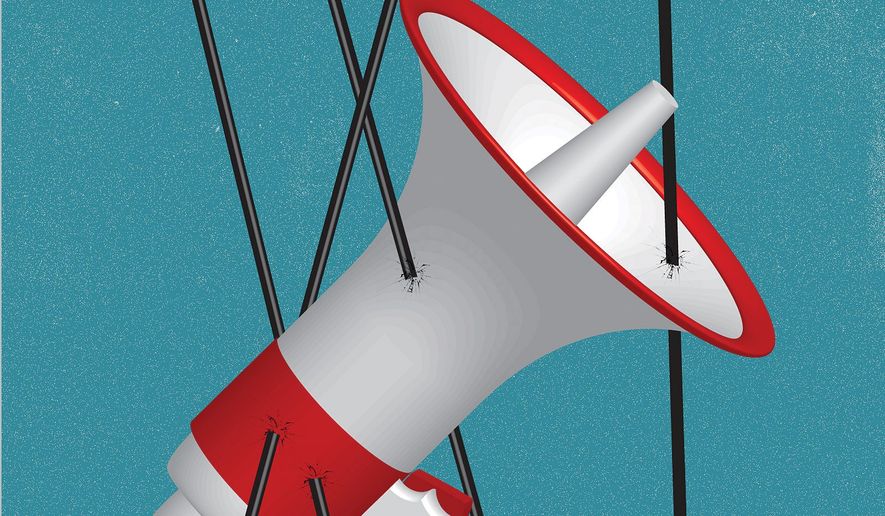OPINION:
Frederick Douglass called freedom of speech “the dread of tyrants. It is the right which they first of all strike down. They know its power.”
Back in the day, tyrants could gag those they ruled, but in free nations people were free, their rights protected. Once Alexander Solzhenitsyn arrived in America, once Natan Sharansky was in Israel, the Kremlin could silence them no more.
Today, tyrants are increasing their reach, attempting, not without successes, to restrict speech everywhere.
What brings this to mind: As a congressional staffer, a scholar at the Foundation for Defense of Democracies (FDD) and director for countering Iranian weapons of mass destruction at the U.S. National Security Council, Richard Goldberg has for years been making the case for a “maximum pressure” sanctions campaign on the rulers of the Islamic Republic of Iran in response to their illicit nuclear weapons program, sponsorship of terrorism and domestic oppression.
So last week Iran’s rulers announced they were “sanctioning” Mr. Goldberg, who is now back at FDD. A year ago, they “sanctioned” FDD in general and, by name, FDD’s Mark Dubowitz, a recognized expert on the Tehran regime, and international economic statecraft, calling them “the designing and executing arm of the U.S. administration” on Iran policy.
Since FDD isn’t contemplating opening an office in Tehran, and no FDD employees plan on vacationing in Shiraz anytime soon, such sanctions may appear symbolic. But they carry a threat. This was made explicit in the statement accompanying the 2019 designations: “[T]his measure will be without prejudice to any further legal measures that the other administrative, judicial or security institutions and organizations may take in order to counter, prosecute or punish” FDD.
How serious is this threat to “punish” (which led to bipartisan condemnation, including from Trump, Obama, Bush and Clinton administration officials)?
According to the U.S. State Department, the theocratic regime’s overseas “campaign of terror has included as many as 360 targeted assassinations” in more than 40 countries. “Iran leverages its well-earned reputation for extrajudicial killings to try to silence civil society through death threats against activists, dissidents, and journalists.”
One definition of war: the use of violence to impose one’s will on others. It is within that context that such murders should be viewed. Iran’s rulers won a pivotal battle back in 1989 when Supreme Leader Ruhollah Khomeini issued a fatwa calling for the killing of Salman Rushdie, British author of “The Satanic Verses.”
One can only imagine how differently history might have unfolded had the response of free nations been robust; had they, for example, recalled their ambassadors from Tehran and sent the regime’s envoys packing. Instead, only the U.K. broke diplomatic relations, and only for about a year.
The tyrants of the world learned a lesson. A report by the British Intelligence and Security Committee of Parliament, about which I wrote last month, estimates that 14 Russian dissidents have been murdered on British soil over recent years.
The rulers of North Korea and China have found nefarious ways to limit speech critical of them, intimidating and manipulating what we might otherwise consider powerful and independent individuals in Hollywood, professional sports, and the news media.
The crime for which Tehran has found Mr. Goldberg, Mr. Dubowitz and FDD guilty is “economic terrorism against the interests” of the Iranian government and citizens of the Islamic Republic of Iran. In part, this is an attempt to strike a blow for a false moral equivalence. Tehran has long been designated by the United States — Republican and Democratic administrations alike — as the world’s leading sponsor of terrorism.
One example: According to the French government, the Iranian intelligence ministry was behind a 2018 plot to bomb a large gathering of Iranian opposition supporters in Paris. “This extremely serious act envisaged on our territory could not go without a response,” read a rare joint statement from France’s interior, foreign and economy ministers. In truth, their response — e.g. freezing the assets of two suspected Iranian intelligence operatives — barely amounted to a slap on the wrist.
More to the point: Equating the murder of dissidents with the imposition of economic sanctions on murderers is risible. The United States has a right — as does any nation — to decide with whom it will and will not maintain commercial relations. As for other countries and the corporations based in those countries, they are free to choose to do business with America or with those who vow “Death to America!” Establishing that they may not do both hardly qualifies as terrorism.
This raises an interesting policy question. For decades, it was widely believed that treating tyrants as respected “stakeholders” in the “international community,” trading with them, providing them aid, welcoming their participation into international organizations, and getting them to sign multilateral treaties would put them on a path to liberalization. That belief, we now know — or should now know — was misplaced.
Perhaps the free nations of the world might consider an alternative: building their own international communities based on comprehensive free trade agreements, while leaving the rogue regimes to manage on their own.
Disabusing ourselves of the comforting notion that commerce and engagement are transformative also should make clear why it is essential that free nations maintain defensive capabilities and mutual defense alliances sufficient to deter adversaries. Bellicose regimes we cannot deter; we will need to defeat. (How do the isolationists and “restrainers” not get this?)
Finally, we should always support, as much as we can, those fighting for freedom and human rights in foreign lands, in the hope that sooner or later they emancipate themselves. “The limits of tyrants are prescribed by the endurance of those whom they oppress.” Frederick Douglass said that, too.
• Clifford D. May is founder and president of the Foundation for Defense of Democracies (FDD) and a columnist for The Washington Times.




Please read our comment policy before commenting.